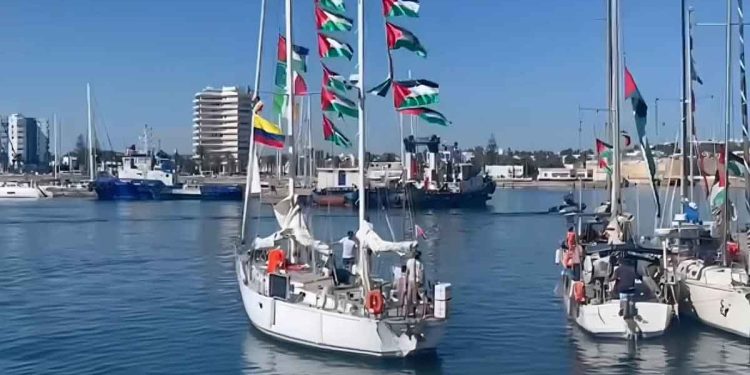A sudden wave of arrests took place at the headquarters of the Egyptian Freedom Flotilla to Break the Siege on Gaza, located in the Dokki district of west Cairo. Three individuals were detained, including two members of the preparatory committee, with authorities refusing to disclose their whereabouts.
This development represents a clear violation of civil and political rights. It occurred amid an intense security clampdown on the headquarters, which in recent days had become a hub for grassroots mobilisation, coordinating aid and preparing maritime convoys to challenge the blockade on Gaza.
The organising committee has announced a state of permanent assembly to follow up on the matter, reiterating its determination to continue despite increasing restrictions. Volunteers from across various governorates continue to arrive at the site, bringing aid and offering support.
These arrests constitute a breach of the Egyptian Constitution, which guarantees the right to assembly and organisation. They also violate Egypt’s obligations under international treaties, including the International Covenant on Civil and Political Rights, which permits restricting freedom of assembly only under narrowly defined circumstances. The authorities’ refusal to disclose detainees’ whereabouts represents a serious infringement of the right to a fair trial and may amount to enforced disappearance, prohibited under international law.
From a humanitarian standpoint, targeting civilians and relief initiatives runs counter to the core principles of international humanitarian law, which asserts the right of civilians to receive aid and prohibits obstructing humanitarian access. Suppressing volunteers seeking to assist the besieged population of Gaza cannot be justified, and it places direct responsibility on the authorities for obstructing legitimate humanitarian work.
What happened at the Freedom Flotilla headquarters is not an isolated incident; it is a direct attack on citizens’ right to stand in solidarity with victims of the blockade. It sends a troubling message that prioritises security repression over humanitarian principles. Such actions not only undermine the current aid campaign but strike at the heart of civic engagement, placing Egypt at odds with its constitutional and international human rights obligations.


























